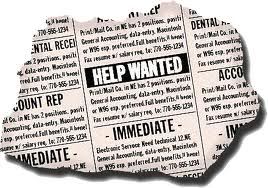Can’t Find the Right Pharmacist Hire? Check Your Job Description
 One of the biggest mistakes hiring managers & pharmacy directors make during the hiring process is writing a vague or incomplete job description. From the thousands of job descriptions I have seen, many are vague. Some job descriptions don’t even convey clearly whether it’s an inpatient or outpatient position. As a result, an HR/pharmacy department is flooded with a large percentage of unqualified candidates that waste their time.
One of the biggest mistakes hiring managers & pharmacy directors make during the hiring process is writing a vague or incomplete job description. From the thousands of job descriptions I have seen, many are vague. Some job descriptions don’t even convey clearly whether it’s an inpatient or outpatient position. As a result, an HR/pharmacy department is flooded with a large percentage of unqualified candidates that waste their time.
A well-written job description is key to attracting the right pharmacist candidates to you. This is a potential candidate’s first impression of what it is like to work at your facility.
Start with writing down values that are important to your pharmacy & facility. For example, “Strong work ethics” or “professional growth”. You will incorporate these values within the job description. Next, write down the purpose of the role. This helps both you get grounded about what to write in the job description, and conveys to a potential applicant how he/she would fit in to the rest of the organization.
 As you are writing this, set the intention to paint a strong picture of what it is like to work at your pharmacy. If you keep this in mind as you write the job description, it will be more powerful than a job description that just follows a typical job description format.
As you are writing this, set the intention to paint a strong picture of what it is like to work at your pharmacy. If you keep this in mind as you write the job description, it will be more powerful than a job description that just follows a typical job description format.
Next, start with the main responsibilities and key aspects that are important in the role. Main responsibilities could include reviewing patient records and labs, preparing IVs, and counseling patients. Key aspects could include teamwork, problem-solving skills, clinical skills, computer skills, and the attitude you want your pharmacist to have.
The size and pace of your pharmacy can be acknowledged. For example, you could mention that the pharmacy current fills on average 800-1000 Rxs/day. Mention any pharmacy-run clinical programs unique to your facility or on-the-job training unique to your facility. Be clear about the schedule expectations.
Describe the technical ability of the pharmacist you are looking for. Example: the ability to process prescriptions with the support of Script Pro Central. Experience with CPOE, McKesson, and bedside coding.
The clearer you are about your ideal candidate not just from the perspective of responsibilities, the more likely you will attract the right pharmacist. You may even wish to incorporate a separate paragraph in your job description describing your ideal candidate. The ideal candidate’s attitude, skills, experience level can be summarized in this paragraph titled “Ideal Pharmacist for this Position”. Phrases like the following can be used: “Self starter”, “Positive attitude”, “being a part of a high-functioning fast-paced environment”, or “handles miscommunication in a professional and direct manner.”
An effective job description also takes a paragraph to express what is unique about the facility. For example, if your pharmacy has been recognized by the hospital for an award, this is attractive to a potential new hire because it shows that the pharmacy focuses on excellence. Highlight strong management support and leadership, if you have it. Pharmacists like to work under a well-supported management.
A paragraph about this may look like “We are a facility recognized as one of the top 100 hospitals to work in the US. Services include….”
 Run your job description by the person in the current role or by someone else in your pharmacy. Ask them if it gives them a strong sense of what the responsibilities entail.
Run your job description by the person in the current role or by someone else in your pharmacy. Ask them if it gives them a strong sense of what the responsibilities entail.
You don’t need to reinvent the wheel. You can share job description ideas among other facilities that have similar roles, however, definitely add in the essence of what makes working at your facility unique.
When you work with a recruiting firm to find the right pharmacist to hire, use the recruiter to take your job description to life. An independent recruiter can paint a picture of what it’s like to work there to a candidate and serves as a walking & talking ambassador for your facility. Use this to your advantage. Although a recruiter can save you time by networking with pharmacists who fit your criteria, assessing a candidate’s honest answers about what he/she really wants in a job, and determining whether the position is a true fit, the important step of creating a well-written job description is not to be skipped. It can be highly supportive to a walking & talking ambassador for your facility. It will lead to finding the right pharmacist for your facility.
How to Transition From Retail to Consultant Pharmacist
Q: Chen, I wanted to look into being a consultant pharmacist for nursing homes but I don’t know how to go about doing that or what the requirements are. It’s been about 2 years since I have graduated and I currently work for CVS and have not done any residency. Any advice?
A: The best way to approach this would be to first connect with any current contacts with pharmacists in the long-term care setting, or contacts from your rotations, ie: if you did a long-term care rotation during pharmacy school.
Making those connections is going to be instrumental in helping you get into long-term care consulting. What you do with the connections is a longer conversation. Just knowing people is not enough. How you approach them and how you convey why you are the best pharmacist for the position is equally as important. I coach pharmacists on a regular basis on how to approach connections or network beyond current contacts to get the job they want.
Next, we need to look at your skill set & experience. What is your experience with long-term care consulting? If you have only been working for CVS, then chances are you have not done any nursing home consulting. If you don’t have experience, you can still get into the role, but you would need to overcome hurdles of convincing the pharmacy hiring manager that you are the best pharmacist for the role.
This may mean persuading them that you review charts easily to make interventions, you work closely with geriatric patients and counseling them on their medications, and that you have worked with nursing home providers. This can be tough if you live in a geographic area with other pharmacists you’re competing with in this tight job market who are more experienced than you and who have direct experience in the long-term care setting.
You could also look into getting your Certified Geriatric Pharmacist (CGP) certification and be board-certified in geriatrics. The next testing window is July 1-Aug 31 and the deadline to sign up is June 15: http://www.ccgp.org. Here is the review information: http://www.geriatricpharmacyreview.com
Depending on where you live, you may also need a separate license to practice consultant pharmacy. Arkansas, for example, requires an “at large consultant pharmacist” permit. Check into your state license requirements. FL requires a that you finish a consultant course sponsored by the FL Board of Pharmacy and get a special license. During your certification process, you will need to have a consultant pharmacist preceptor. Get to know your preceptor well and who may be able to refer you to a facility if they are impressed with your skill set.
An easier way to get into a consultant pharmacist position without prior experience is to get your foot in the door first. Get a position as a staff pharmacist servicing nursing homes and get to understand the inner workings of a nursing home pharmacy . Impress your boss working in that role, get clear about the requirements they look for in order for you to become a consultant pharmacist at the pharmacy, and then create a plan for moving into that role down the road.
For more guidance on how to transition into a consultant pharmacist job in this job market, stay tuned for expert interviews of pharmacists who are already in these positions and advice from them about how to get into the positions. You will get the scoop on getting access to these live interviews if you are a part of our community. To become a part of our community & stay connected on events offered first to our community, click here to get access to unadvertised jobs. To book your free 20-minute “Get the Job” Strategy Session, click on the link.
If you have experience transitioning into a long-term care consulting position from another practice setting, share your experience below.
Pharmacist Job Market Update
Here’s the latest pharmacist job market update:
More job opportunities are opening up for pharmacists, as pharmacies & companies are more interested in hiring, compared to late 2009. Positions are getting filled quickly in areas saturated by pharmacists, especially those that are staff level ones with desired shifts. It is refreshing to see some pharmacies ready to hire and quick to make decisions. Pharmacists are having to beat other pharmacists to the punch, because once a coveted position becomes available, pharmacies are being flooded with applicants.
On the flip side, I am seeing other pharmacies take extra care in waiting for the right pharmacist, more so than in the past. I know one hospital that waited 8 months to find the right critical care pharmacist. The pharmacy director chose not to look at critical care trained residents who had only one year of experience beyond residency, nor critical care pharmacists without a residency. Their minimum requirements were that the pharmacist had to be PGY2 critical care residency-trained and have at least 2 years of critical care experience as a pharmacist. And the pharmacy director was willing to wait for someone who met that criteria and was the right fit.
I know another hospital that has waited months for the right candidate for a clinical coordinator position. They have been waiting for someone who is cream of the crop. Even staff pharmacist roles are not immune to this type of extra selectivity and hiring managers waiting for the right person. One pharmacy in Northern California has had a staff pharmacist opening for a few months. Despite receiving many qualified candidates, they have chosen to hold off on hiring until finding someone who is the perfect candidate.
Clinical specialists that are in high demand are Read more